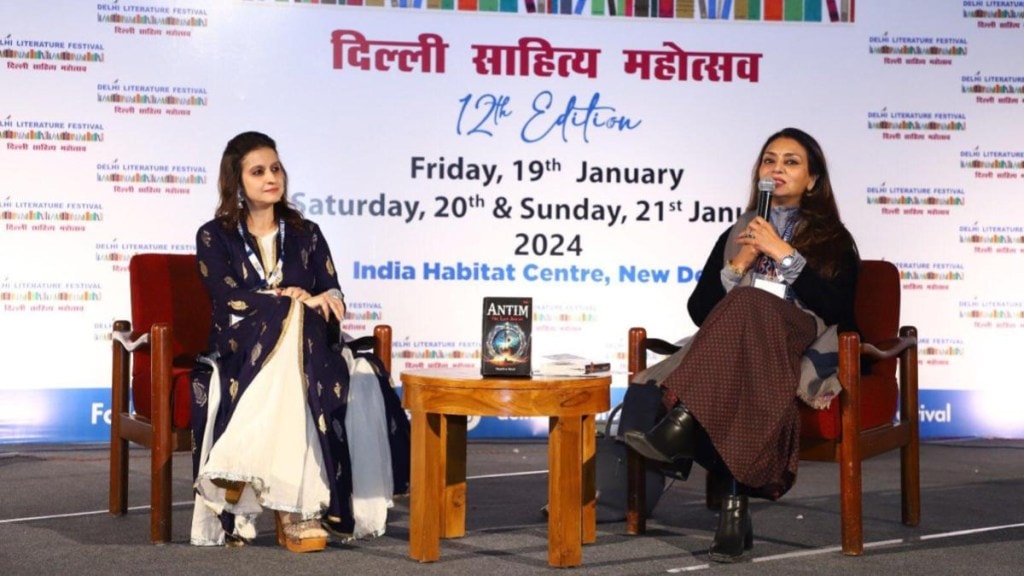At the recent 2024 Delhi Literature Festival, Arundhati Roy’s The Ministry of Utmost Happiness rubbed shoulders with Ram Janmabhoomi: The Inspiration for Hindu Resurgence by Rashmi Samant, and Hindus in Hindu Rashtra by Anand Ranganathan. Several titles had nouns Lord Ram, Ayodhya, and Hindu.
“We feel that such books need to be shared with readers as they offer an alternative narrative, one that was never told,” says festival founder Ajay Sharma. “While the texts in the past have been highly dominated by the Leftist ideology, new books such as that by Ranganathan and journalist Rahul Shivshankar offer an alternative narrative, which is also finding a lot of acceptance among the audience,” he adds. Hindus in Hindu Rashtra by Ranganathan, a regular on TV debates, is among the top sellers on Amazon.While “a new narrative has shaped up over the past 10 years,” as Sharma puts it, we are also seeing the blurring of the lines between what is seen as faith, history, and politics. While offering democratic spaces for wide-ranging perspectives, literature fests and literary spaces haven’t been untouched by such intersections. Perhaps the most famous example is the brutal attack on Satanic Verses author Salman Rushdie in 2022 that damaged one of his eyes and arms. Also, at the 2023 World Book Fair, a group of protesting men raised the slogans of Jai Shri Ram and Bharat Mata ki Jai and allegedly vandalised a stall belonging to a Christian non-profit organisation, shouting “Free Bible band karo”. Like the Delhi Literature Festival, topics on faith — from Tulsidas’ Ramcharitmanas and idolatry to facets of Jainism — were discussed at the recently-concluded Jaipur Literature Festival. “This is neither the first time nor the last that such topics are discussed at the JLF. Literature has a place for religion, but we focus more on what’s behind it — the spirituality, the philosophy — as it’s the written text as opposed to the myth it should be, or the fact that religion today is used for landgrab or violence. That’s not the purpose here, but to push back. And how do you do that? Not by saying ban it, but by being able to approach it from a way through knowledge and consideration,” says Sanjoy K Roy, managing director of Teamwork Arts, the producer of the Jaipur Literature Festival. Deepthi Talwar, executive editor, Penguin Random House India, says, “There has been an increase in books on Hindu philosophy recently.” However, these largely fall into the self-help and spirituality realms, according to the publishing house. Concurring that, Sachin Sharma, associate publisher, HarperCollins, says, “Spiritual self-help and commentaries on Vedic scriptures are quite popular among readers.”Adds Poulomi Chatterjee, publisher, HarperCollins: “Retellings that highlight different or as yet-to-be explored content from scriptures and epics and retellings of myths and folklore are also popular.”
While both publishing houses, which bring out books across genres, are the most well-known, India’s biggest by volume is a little-known Gita Press. This Gorakhpur-based publishing house, started in 1921 by two Marwari businessmen, publishes Hindu religious texts, primarily in Hindi, which preach the tenets of Sanatana Dharma. It also brings out the highly-subscribed monthly magazine Kalyan which has about 2.5 lakh subscribers, as per a media report. While religious texts have always remained popular, Gita Press has often espoused a conservative, narrow-minded, and patriarchial mindset, and even took a political position against the Hindu Code Bill. It also steered clear of social reforms such as women empowerment and widow remarriage. Notably, the press was awarded the Gandhi Peace Prize of 2021. Along with religious texts, fictional interpretations of these have also remained popular. Books by authors like Amish, Devdutt Pattanaik, and Chitra Banerjee Divakaruni have been highly popular in this genre.Divakaruni, who is credited with retelling epics Ramayana and Mahabharata from the lens of its female protagonists Sita and Draupadi, cautions, “It is important for literature to present us with heroes and admirable characters who are also complex and human, and if we use mythological figures for propaganda, in my mind that is a sad misuse of their potential.”Speaking on the role played by books in the growing religious majoritarianism in the country, the writer highlights it isn’t a new thing and that books have been misused down the ages in many ways—sometimes to create propaganda, sometimes to garner hatred. “I hope that both writers and readers will recognise the immense power of words and use them for their best purposes—to examine our times and uphold our common humanity. Readers can influence this to a great extent by only buying such books.”








